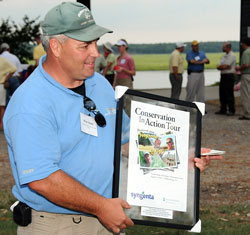 The Colonial Soil and Water Conservation District provided significant help to the Conservation Technology Information Center is setting up and putting on the Conservation In Action Tour. Brian Noyes received recognition at our tour dinner. I spoke with him during one of our farm stops.
The Colonial Soil and Water Conservation District provided significant help to the Conservation Technology Information Center is setting up and putting on the Conservation In Action Tour. Brian Noyes received recognition at our tour dinner. I spoke with him during one of our farm stops.
Brian says the District deals with a lot of diverse issues in their area and works with farmers on how they’re managing their land and resources. He says one of the primary methods the farms we visited are using is continuous no-till. He says that they create a lot of biomass by planting a crop like corn followed by wheat followed by double crop soybeans and in some years even a cover crop. This can add up to 4 crops in two years. Some of the acres we were seeing haven’t been tilled in decades.
Nutrient management is also a major element of the efficient management practices being applied on these farms. He says they’re seeing a trend of cutting back on nitrogen use but still seeing yield increases. The ability to better manage nutrients is helped by the benefits farmers have seen using no-till practices. This is economically and environmentally positive. Brian’s office helps farmers be more “precise.” So speaking of precision, Brian says farmers have been “spoon feeding” their nitrogen for years. Precision ag is playing a key role in the management of this application.
One of the things that Brian says is a challenge is showing how these management practices are benefiting the local watershed. That’s where modeling comes in. But with models politics comes into play. So he says they need to do more measuring and urges people to take models in context.
Brian Noyes InterviewConservation In Action Tour 2010 Photo Album
AgWired coverage of the Conservation In Action Tour is made
possible by ![]() and the
and the ![]()
